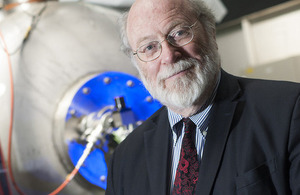UKAEA board members re-appointed
David Willetts announces the re-appointment of Professor Roger Cashmore as Chair of the UK Atomic Energy Authority.

UK Atomic Energy Authority board members re-appointed
David Willetts, Minister for Universities and Science, today announced the re-appointment of Professor Roger Cashmore as Chair of the UK Atomic Energy Authority. Also re-appointed are non-Executive Board members Professor Sir Keith Burnett, Peter Jones and Steve McQuillan.
David Willetts said, “I am delighted that Professor Cashmore and the non-Executive Directors have agreed to be re-appointed to the UK Atomic Energy Authority Board. The Board continues to have a strong mix of academic expertise coupled with public and private sector experience which will serve the Authority well going forward.”
Professor Cashmore said, “I am delighted to be able to continue to lead the Authority Board in what are exciting times ahead for Culham – one of the world’s leading fusion research laboratories. Culham is increasingly involved in shaping the design of the next step international experiment (ITER) and the first demonstration fusion powerplant (DEMO), and I look forward to ensuring it has a successful and vibrant future.”
Notes to Editors
Professor Roger Cashmore was initially appointed as Chair on 30 July 2010 for 3 years. He was re-appointed on 30 July 2013 for a further 4 years. The remuneration will be £25,000 for on average 20 days per annum.
Professor Sir Keith Burnett, Peter Jones and Steve McQuillan were initially appointed on 1 November 2010 for 3 years. Professor Burnett and Mr Jones will be re-appointed on 1 November 2013 for a further 3 years. Mr McQuillan will be re-appointed on 1 November 2013 for a further 2 years. The remuneration will be £15,000 for an average of 12 days per year.
These reappointments have been made in accordance with the requirements of the Code of the Commissioner for Public Appointments. All appointments are made on merit and political activity plays no part in the selection process. However, there is a requirement for appointees’ political activity to be made public. All four have confirmed that they have not been involved in any relevant political activities in the last five years. Professor Cashmore is currently Chair of the Nuclear Research Advisory Council. Professor Sir Keith Burnett is currently a member of the Prime Minister’s Council for Science and Technology. Peter Jones is currently a non-executive Director and Chair of the Audit Committee of the National Nuclear Laboratory Limited and a reporting panel member of the Competition Commission.
Professor Cashmore is a Fellow of the Royal Society and in 2010 led the Royal Society working group on Nuclear Proliferation. He is a former Principal of Brasenose College in Oxford, and is a Professor of Experimental Physics in Oxford. He was Director of Research and Deputy Director General of CERN where he was responsible for the experimental programme at the Large Hadron Collider (LHC). Professor Cashmore was awarded the Companion of the Most Distinguished Order of St Michael and St George for services to international science.
Professor Burnett became Vice-Chancellor of the University of Sheffield in 2007. Previously he was Head of the Division of Mathematical, Physical and Life Sciences at the University of Oxford. His research is in the area of ultra cold atomic physics. He is a member of the Infrastructure UK Advisory Board. Professor Burnett received a Knighthood in the 2013 New Years Honours for service to science and higher education.
Peter Jones is a Fellow of the Chartered Association of Certified Accountants. His previous roles have included: Corporate Finance at Samuel Montagu & Co. Limited and HSBC Investment Banking, as a senior adviser to the Department of Trade and Industry (DTI) during the 2003-4 strategic review of BNFL, consultant to the Shareholder Executive and DTI during the final preparations for the restructuring of the civil nuclear clean-up sector in 2004-05.
Steve McQuillan is currently the CEO of the listed UK Engineering group Avingtrans plc. Previous positions included Director/CEO of the National Physical Laboratory (working for Serco) and Divisional Managing Director of Oxford Instruments Superconductivity Ltd. Steve also has advisory board roles in Engineering UK and the EEF. A graduate electronics engineer, Steve is a Fellow of the Institute of Physics and a Fellow of the Institute of Directors.
The United Kingdom Atomic Energy Authority is a non departmental public body (NDPB) within the Department for Business, Innovation and Skills (BIS). Originally formed in 1954 to carry out nuclear research for the UK government, the Authority now manages the UK fusion research programme and operates the Joint European Torus (JET) on behalf of the European Fusion Development Agreement (EFDA) at Culham, Oxfordshire.
The government’s economic policy objective is to achieve ‘strong, sustainable and balanced growth that is more evenly shared across the country and between industries’. It set four ambitions in the ‘Plan for Growth’, published at Budget 2011:
- to create the most competitive tax system in the G20
- to make the UK the best place in Europe to start, finance and grow a business
- to encourage investment and exports as a route to a more balanced economy
- to create a more educated workforce that is the most flexible in Europe.
Work is underway across government to achieve these ambitions, including progress on more than 250 measures as part of the Growth Review. Developing an Industrial Strategy gives new impetus to this work by providing businesses, investors and the public with more clarity about the long-term direction in which the government wants the economy to travel.